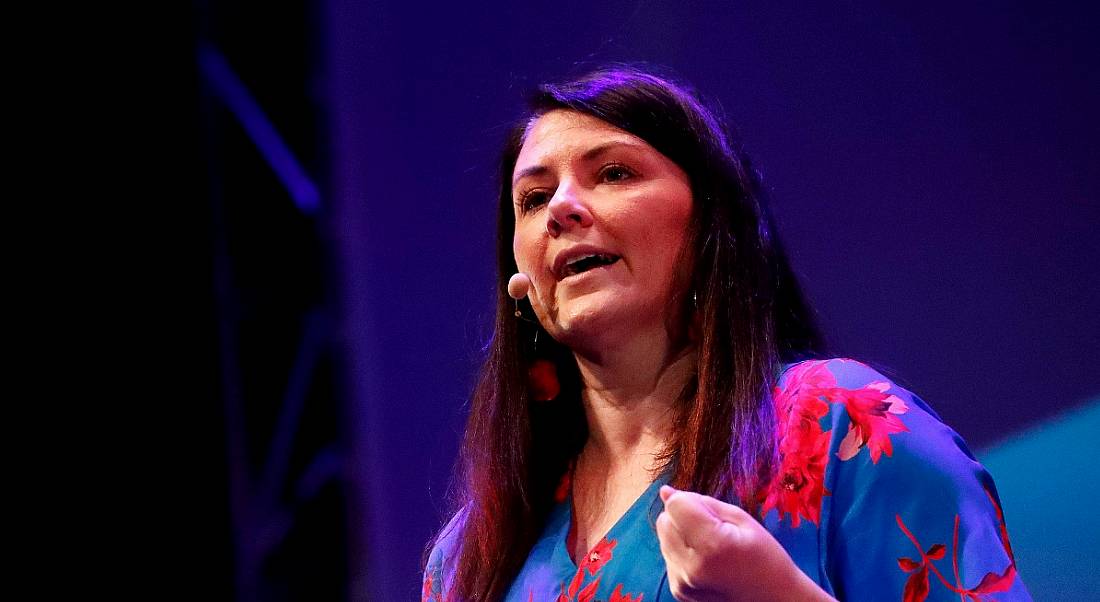Welcome to the future of work – have we fixed it yet?
What does the future of work mean to you? Does it mean more jobs or fewer? Does it mean a fully remote workforce? Will technology become a bigger part of your work life?
What about your wellbeing as an employee? How will work-life balance change with the future of work?
A lot of the movements around the future of work involve technology that will make working easier, more remote and cost-effective. In fact, the future of work seems to be solving a lot of workplace problems, but are they the right ones?
HubSpot’s chief people officer, Katie Burke, spoke at Inspirefest earlier this year about the future of work. I asked her about how she sees the future of work changing the world for the better and the pitfalls all employers should look out for.
What do you think will change about workplace wellbeing in the future of work?
Everything and nothing. By everything, I think we’ll see AI and machine learning automate and inform far more of our daily tasks than we can even wrap our collective heads around. I think the proliferation of technology will put the onus on companies and managers to be significantly more transparent than they currently are, which, long-term, will be great for employees and job candidates.
By nothing, I mean that, I think, in talking about the future of work, people tend to talk about technology and automation in isolation. What I don’t think will change about work is that people want a sense of purpose in what they do. They want to work with people they deeply admire, they want to lead interesting and dynamic lives outside of work, and they want to feel they are growing and learning. So, in talking about what will change, we also have to be mindful of what won’t.
My hope is that, in the future, more people will build their work around their lives instead of the other way around. If you have more flexibility to build the work you do around the people and things you care most about, a whole world of possibility opens up in the workforce and in what we are capable of doing.
Is there any trend that you believe people aren’t paying enough attention to?
Yes, ageing parents. There is a lot of discussion around childcare and families, as well there should be, but we are seeing an increasing number of people in our employee population globally struggle with both the stress and cost of caring for ageing parents.
As humans live longer, we haven’t yet figured out both how to ensure we are thinking about caring for our elders but also for the people who care for our elders. It can be very rewarding but also incredibly taxing work, and our current systems aren’t set up to make that both more human and empathetic, and more scalable.
There’s a lot of great work going into AI and HR tech to eliminate unconscious bias, increase diversity and ensure there is a good culture fit. But what about problems such as burnout?
It’s a funny thing, burnout is a buzzword in tech, and it’s an important discussion, but I actually think that the conversation should start with performance. You simply cannot perform at your best if you’re running on empty all the time – that’s basic science.
So, if you start with the premise that humans simply perform better when we rest, recharge and refuel more regularly, you start to open up the conversation to be less about burnout avoidance and more about a holistic picture of how people live and work.
I have found you need to articulate the positive benefit of a given investment instead of just the challenges of burnout to get people really engaged in the conversation. In HubSpot, we’ve formed a partnership with UnPlug HQ and participated in a documentary with RTÉ on this topic specifically because we want to arm our employees and managers with the tools they need to make recharging and rest part of their daily rituals instead of an afterthought.
We aren’t perfect, not even close, but we are evolving and improving the conversation with our teams as we grow.
Do you think there are potential pitfalls with automation that could make problems such as overwork worse?
My hope is that it’s the opposite. By automating things that don’t require human interaction, we create opportunities for more meaningful work done by humans.
However, we all have to be careful that the shift to automation isn’t just good for some of us. I’m very concerned about automation only being leveraged to eliminate or reduce hours for folks who work in current frontline roles in things like retail, so one of our charges as a society is to ensure that the shift to automation doesn’t perpetuate or worsen the class divide that exists globally.
You already see in Dublin a gap between the evolution of the tech sector and the degree to which it feels accessible to everyone, and I want to ensure that, over time, leaders in tech are thoughtful about how we can help close that gap.
How we view productivity has shifted dramatically over the years. How do you feel about productivity and how it is perceived?
I feel that traditional perceptions of productivity are rooted in the industrial revolution – how many widgets a line can produce in a given hour, day or month.
I prefer thinking about performance and impact. It expands the conversation outside of just what you make, and gives room for the ‘how’ and the ‘why’. Results are really important, but so too are the processes, inputs and failures that help us get to better impact long-term.
Do you have any personal productivity tips to help you get through the day?
I’m no expert on this topic, not even close, but I do exercise every morning. Whether it’s going for a run or a yoga class, it gives me time and space to think and relax, and it sets the tone for the remainder of my day.
The other tradition I’ve adopted from a group called The Energy Project is reserving time each week in my diary to express appreciation. Gratitude is a transformative emotion that helps you lead more effectively, so I’ve built in thanking others – be it employees, candidates, partners, customers, or my family and friends – as part of my calendar.
Inspirefest is Silicon Republic’s international event celebrating the point where science, technology and the arts collide. Ultra Early Bird tickets for Inspirefest 2019 are available now.




